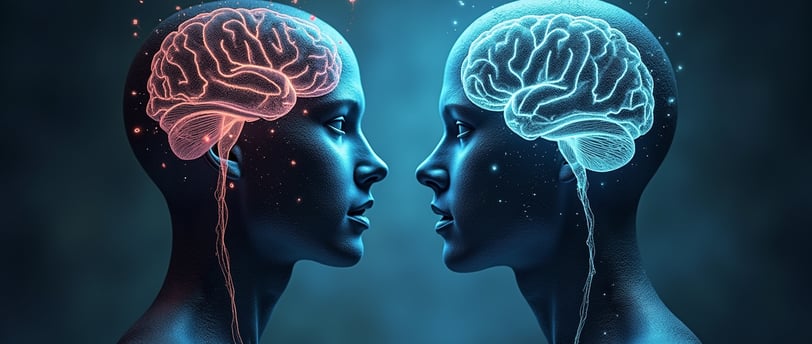The AI vs. Human Intelligence Debate: Unveiling the Future of Cognition
TECHNOLOGY
Reshma Hasdah
3 min read


Today, AI vs human intelligence is a highly debated topic in our rapidly changing technological landscape. With AI zooming Peak of significant advancements in all industries, such as finance and healthcare, many people are curious about whether machines will ever truly replace the human brain in a different field?? In this blog, we will discuss the difference between AI and human intelligence, focusing on their unique strength, limitations and potential for collaboration.
The Human Edge: Training on Emotional Intelligence, Creativity, and Decision-Making
You will be trained on data that is unique to humans (and as such should be celebrated)
Trained on Emotional Intelligence– The aspect that separates the Human intelligence is its emotional intelligence, which makes training even more important.
a) Empathy and gut feeling: Humans are naturally adept at relating to the feelings of others in a way that machines simply cannot reach — at least, not within a time frame of a second or two.
b) Complicated Decision-Making: Emotions play a key role in human decision-making, often overpowering cold rationality.
c) Creativity and Ingenuity: Humans prove time and again the endless creativity in art, problem-solving, the human spirit.
The World of AI: Processors Beyond All boundaries.
Artificial intelligence is an incredible ability that allows enormous amounts of data to be processed at super-fast speed to exhibit specific thought processes.
1)ABILITY TO WORK SMART: Power of AI
AI is good to go for it as it does a lot of data processing and analysis and can analyse the data in a way no one can, as it can find patterns in the data that are missed by humans.
2) Automating Repetitive Tasks: AI can handle monotonous tasks for you with phenomenal precision. This factor is important and widely used across dozens of industries and is applicable within enterprise operations, from the factory line to corporate jobs.
The Rise of AI: Machine Learning and Evolution
a) Continuous Improvement: Since machine learning is at the heart of artificial intelligence, it allows systems to adapt and improve as they train on data. Over the years, they become very sophisticated. Simply put, it is like an infant learning from experiences and returning strong after every attempt.
b) Adaptability: AI demonstrates extraordinary adjustments in multiple fields. It has been used in applications such as language translation, generating complex strategies for games, and even in self-driving cars — to name a few.
AI and Human Intelligence: A Relationship That Flares
Rather than viewing AI and human intelligence as adversaries, Let us marvel at the possibility. This builds hope and positivity regarding cognitive development in the future.
Enhancing Human Capabilities
There are many ways AI can amplify human capability:
1. Transforming Healthcare: With AI-enabled diagnostics, healthcare experts can detect diseases earlier, improve diagnostic accuracy, personalize treatment plans, and enhance patient outcomes with faster and more efficient analysis.
2. Decision -Making : Decisions can be taken more accurately and in a more timely manner.
3. Tailored Learning: AI can be used to ensure that students' learning trajectories are further tailored to their individual needs.
Making Ethical Decisions in the Age of AI
Artificial intelligence is a game changer on many levels, but it has important ethical implications. In this age of AI, this awareness of potential pitfalls and the accountability for addressing them will be key.
a) Shift in Labor: A remarkable implication of the automation of tasks that used to be performed by humans is the job market.
b) Data Privacy: Given the data-centric nature of AI, concerns about the collection, usage, and protective measures of personal information come into the picture.
So, once again, Conclusion: A Collaborative Future
In the coming context of cognition in artificial intelligence, we realize that the appearance of artificial intelligence and human intelligence can couple each other rather than withstanding, as AI is proficient in covering and analyzing a set of databases in a fraction of time. In contrast, the human brain dispenses an unmatched depth of emotion and creative vision. The future, however, is not a stateless utopia but the seamless co-mingling of the two.
By encouraging collaboration between AI experts, ethicists and society, we can harness the power of both human and artificial intelligence. Together, we can catalyze strides toward a better-looking world that is improved and augmented by technology, not replaced by it. While we continuously push the frontiers of what we can achieve, it is important to do it responsibly. We need to make sure that AI’s advances help humanity rise